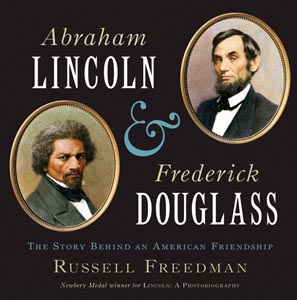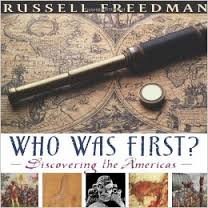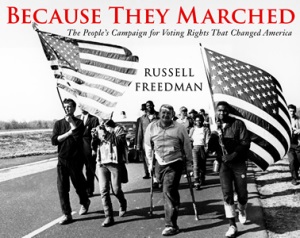2018 School Spending Survey Report
Changing Times
I’ve been writing nonfiction books for young readers, mainly history and biography, for more than fifty years — since the days of typewriters and invented dialogue.
 Beyond obvious changes in format, histories and biographies for kids today reflect new approaches to history that place a greater emphasis on the role played by ordinary people and by the grassroots forces that drive social transformation. My Abraham Lincoln biography was published in 1987. I’m sometimes asked what changes I might consider if I were writing the book today. I’ve addressed that question with my recent book, Abraham Lincoln and Frederick Douglass: The Story Behind an American Friendship, published in 2012.
Beyond obvious changes in format, histories and biographies for kids today reflect new approaches to history that place a greater emphasis on the role played by ordinary people and by the grassroots forces that drive social transformation. My Abraham Lincoln biography was published in 1987. I’m sometimes asked what changes I might consider if I were writing the book today. I’ve addressed that question with my recent book, Abraham Lincoln and Frederick Douglass: The Story Behind an American Friendship, published in 2012.A quarter of a century ago, Lincoln’s brief but telling friendship with Douglass was not a subject that received a lot of attention in the vast and ever-expanding Lincoln literature. My 1987 biography includes several references to Douglass’s meetings with Lincoln and his changing opinion of the president, but it does not delve into the parallels in their lives or the implications of their friendship. But that was then. Recent years have seen the emergence of a group of scholars who have examined in depth the Lincoln-Douglass relationship and its consequences for the Civil War and for race relations in America. Their work has advanced the study of Lincoln and emancipation by treating Frederick Douglass as an equal protagonist and by identifying African Americans as collaborators in their own deliverance.
Lincoln is justly famous as the Civil War president who freed the slaves, but he didn’t accomplish that all by himself. Historians today recognize that history doesn’t flow exclusively from the top down. It emerges also from the bottom up, when ordinary, often anonymous people fight for their own cause. Emancipation, like all far-reaching political change, resulted from events at every level of society, including the efforts of abolitionists to influence public opinion, and the struggles of the slaves themselves to win freedom. “From the beginning of the Civil War,” writes historian Eric Foner, “by escaping to Union lines, blacks forced the fate of slavery onto the national political agenda….Slavery died on the ground, not just in the White House.”
To emancipate the slaves, Lincoln needed the participation of the slaves. And he needed the support of people like Frederick Douglass.
The blockbuster movie Lincoln was released in 2012, the same year as my Lincoln/Douglass book, and if I may venture an unbiased opinion, the book is so much better than the movie. The book takes on the racial politics that the movie downplays. Frederick Douglass is nowhere to be seen or heard in the film. In an Op-Ed piece for the New York Times, historian Kate Masur criticized the film’s tone-deafness to recent changes in historical scholarship. She wrote that the film “helps perpetuate the notion that African Americans have offered little of substance to their own liberation….It reinforces, even if inadvertently, the outdated assumption that white men are the primary movers of history and the main sources of social progress.”
Another historical myth that has been swept aside concerns the so-called “discovery” of the Americas. When I was a schoolboy, we all knew who discovered America: In fourteen hundred and ninety-two, Columbus sailed the ocean blue. Maybe so. But as school kids know today, an intrepid band of Vikings led by Leif Eriksson established a colony in Newfoundland in the year A.D. 1000 — five hundred years before Columbus.
 Now, it happens that the Vikings had a run-in with some local Indians — Native Americans as we say today. So who were the ancestors of those Newfoundland Indians? Where did they come from? And when did they arrive? That’s the subject I examine in my book Who Was First? Discovering the Americas, published in 2007.
Now, it happens that the Vikings had a run-in with some local Indians — Native Americans as we say today. So who were the ancestors of those Newfoundland Indians? Where did they come from? And when did they arrive? That’s the subject I examine in my book Who Was First? Discovering the Americas, published in 2007.As we dig deeper into the past, we find that the Americas have always been a land of immigrants, a place that has been “discovered” time and again by different peoples coming from different parts of the world over the course of countless generations — going far back to the prehistoric past, when a band of Stone Age hunters first set foot in what truly was an unexplored New World.
 My latest book returns to the theme of grassroots social activism. Because They Marched: The People’s Campaign for Voting Rights That Changed America will be published by Holiday House in August, 2014. It tells the story of the fifty-four-mile Selma to Montgomery march that led to the landmark Voting Rights Act of 1965. While Martin Luther King Jr. and other civil rights leaders played significant roles in the Selma voting rights campaign, that effort was initiated and carried out by ordinary people — schoolteachers and janitors, maids and cooks, schoolchildren and grandparents — who had the courage to demand their rights in the face of savage Jim Crow repression.
My latest book returns to the theme of grassroots social activism. Because They Marched: The People’s Campaign for Voting Rights That Changed America will be published by Holiday House in August, 2014. It tells the story of the fifty-four-mile Selma to Montgomery march that led to the landmark Voting Rights Act of 1965. While Martin Luther King Jr. and other civil rights leaders played significant roles in the Selma voting rights campaign, that effort was initiated and carried out by ordinary people — schoolteachers and janitors, maids and cooks, schoolchildren and grandparents — who had the courage to demand their rights in the face of savage Jim Crow repression.An unexpected twist to this story occurred while I was still revising my manuscript. The U.S. Supreme Court struck down a key section of the Voting Rights Act — a controversial five to four ruling that was denounced by civil rights advocates and may in time be reversed by Congress. In opposing written decisions, Chief Justice John G. Roberts Jr. and Justice Ruth Bader Ginsburg drew sharply different lessons from the history of the civil rights movement. Roberts argued that the law’s original requirements were no longer needed because “our country has changed.” Ginsburg countered that while some barriers to voting have been abolished, discrimination at the ballot box continues in different forms and is growing.
The right to vote continues to be challenged, and the meaning of American democracy remains a topic of debate and struggle, as it has been since the nation’s founding through the Civil War to Selma and beyond. So not only our understanding of history, but also historical gains, or progress, cannot be taken for granted. Struggles have to be refought and kept alive — in the courts, in the streets, and in books.
I’m fortunate that I’ve been able to spend my working life writing about subjects that I find compelling and significant. I’ve published some sixty books covering a span of history from Confucius to Martha Graham. I’ve learned a lot. My views have evolved. I’m still practicing my craft. And I’m grateful that the Kerlan Collection has offered to preserve my manuscripts and other archival materials.
This article is a slightly edited version of Russell Freedman's Kerlan Award acceptance remarks, delivered on the author's behalf by Kate DiCamillo at the awards luncheon on March 29, 2014. Read more from The Horn Book on Russell Freedman on the Kerlan Collection.
RELATED
RECOMMENDED
ALREADY A SUBSCRIBER? LOG IN
We are currently offering this content for free. Sign up now to activate your personal profile, where you can save articles for future viewing.







Add Comment :-
Be the first reader to comment.
Comment Policy:
Comment should not be empty !!!